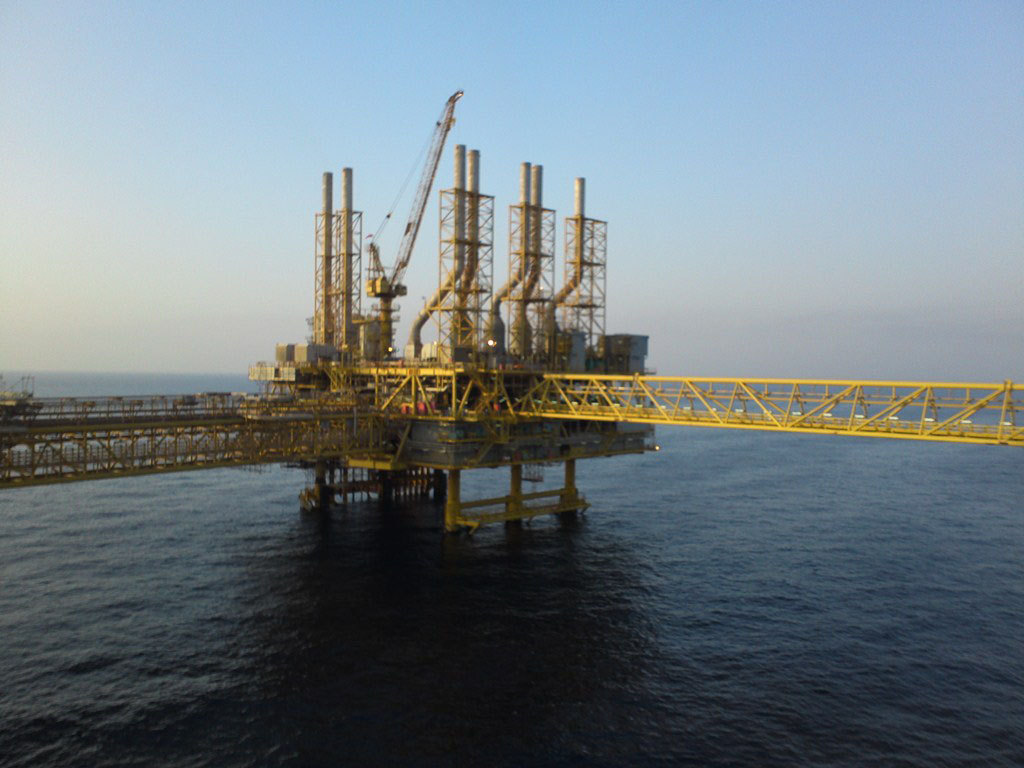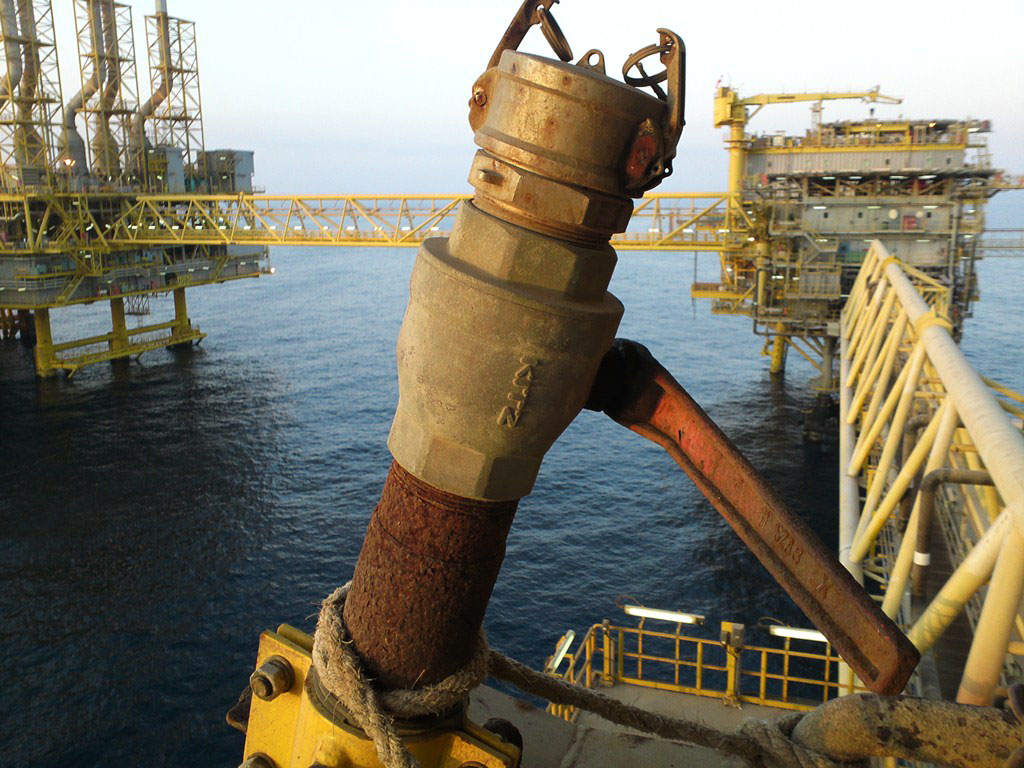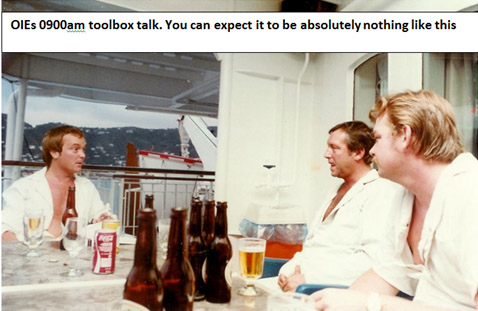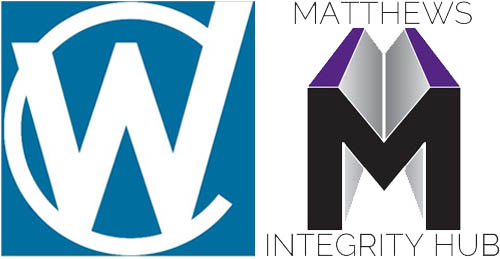OFFSHORE INSPECTION ENGINEER (OIE) ROLE
Typical job titles are;
- Offshore inspection engineer (OIE)
- Offshore inspector
READ THIS FIRST: IT’S ALL ABOUT LIFESTYLE
In the offshore industry, some people love the life on an offshore platform, and probably keep scrapbooks containing seagull feathers and canteen serviettes as mementoes to show their grandchildren. Others moan and wish their life away from the minute they arrive on board, counting the number of days to when they can get off.
If you like walking in the fresh air admiring the scenery, forget it; there’s nowhere to go and nothing to see. You are living in a steel box. It’ll probably be either too hot or too cold outside and smoking whilst leaning over the rail is not exactly de-rigueur. You will find the working regime surprisingly relaxed and informal if you are used to armed forces or prison environment (no need for your shoe-shine and ironing kit) but you will truly recognise some of the rules and restrictions, the shared cabins and facilities and general lack of privacy.
Food is good hotel standard, which you will find doesn’t stop people complaining about it. Sadly, those of you with an eclectic appreciation of the hop or the grape will need to wait until you return to the heliport…there’s no alcohol on board these places, making for quiet evenings. Get to like films, quizzes and ice-cream. The early morning helicopter rides are exciting though, if you like helicopters and the fashionista effect of large people in orange survival suits.
Job security has its ups and downs with the fluctuating oil price but overall is pretty good. The financial rewards are good also and reflect the fact that this is, like many others, perhaps not a lifestyle that would suit everyone.
 The job
The job
This family of jobs is unique in the inspection industry. Inspectors are resident on various types of oil exploration, drilling or production offshore platforms (known as the upstream part of the oil industry). Work schedules vary but are typically 2, 3 or 4 weeks on the platform, followed by a similar or shorter period of holiday. Whilst on-board, the working shift is nominally 12 hours, but this includes periods for meals, meetings, sitting around and general chit-chat.
The inspector’s role consists of a lot of monitoring NDT activities during both in-service and shutdown states. Unlike onshore refineries (the downstream part) most plant overhauls, repairs, refurbishment etc. takes place elsewhere (i.e. in onshore location) so the offshore inspector’s degree of involvement is much less. Technical options and decisions are managed by an onshore ‘Technical Authority (TA)’ with often no need to consult back to the inspector resident offshore. Over time the offshore inspector role can trend from being technical to mainly procedural; dealing with equipment lists, inspection plans, reports, safety documents and suchlike, and everybody feels busy.
Skill levels
Offshore inspectors do not need such a wide spread of skills and experience as that required for equivalent downstream (offshore refinery) jobs. This is due to the restricted types of equipment found in offshore installations and the fact that much of the corrosion evaluation, repair procedure etc. work is done by people onshore. Many OIEs have previous experience (and qualification certificates) in welding and NDT but are weaker in other mechanical disciplines.
API certificates (mainly the API 510 vessel inspector and API 570 pipework inspector) are becoming increasingly requested for entry to OIE positions. These are recognised throughout the world in the oil and gas industry. In some countries, getting an OIE job becomes easier if you also have some level of welding inspection qualification (AWS Certified Welding Inspection in the USA or PCN/CSWIP in some other countries) and corrosion appreciation qualifications from NACE.
 Academic-v-practical ability?
Academic-v-practical ability?
Practical and NDT knowledge is more useful for an OIE role than academic qualification. Some large employers may ask a HND/HNC or similar college qualification, or some kind of Institution membership (e.g. Incorporated Engineer status). You can think of this as being part of a screening procedure that their HR departments can easily recognise.
Over time, it is fair to say that the amount of pure technical knowledge that you need to perform an OIE job will actually reduce, as you get more involved in writing procedures, planning schedules and safety-related stuff. This is fine, as long as that is only where your ambitions lie.
Are OIE skills transferrable?
Yes, the technical role of an OIE doesn’t change much between employers or locations in the world. There are big differences in the level of competence and disorganisation between some parts of the world but the inspection activities and challenges remain much the same. As always, you will need to travel if you want to get the best deal.
Moving from an OIE job to an equivalent refinery job onshore is more difficult Higher-level downstream inspection jobs require you to have a much wider spread of technical knowledge and technical qualifications if you want to match the salary level you had offshore. You will also need to accept substantially fewer holidays and an increased individual work commitment. Surprisingly few OIEs make this transition successfully – it is more common to take a step backward to an NDT position and accept the reduced salary and benefits.
 Salary levels
Salary levels
Moving onshore will generally mean you taking a substantial pay cut. Once there however, salaries for full time staff inspection engineers in onshore refineries are higher than a similar role in other onshore employers. The margin reduces however, once you move outside the major oil companies to lower tier parts of the industry (tank storage companies, product transport etc.). There can be a 50% difference between the upper and lower inspector salaries there.
In common with many industries these days, offshore employers often don’t like to show what salary they are offering in their job adverts. Read our article Why don’t job ads show salary levels and find out why this is.
Matthews Integrity Hub: HEAD OFFICE is OPEN EVERY DAY….0730 – 2200 Monday – Sunday…That’s correct, all week, every week, including holidays
 If we happen to miss your call, leave a message and we will call you back just as soon as we pick it up. Sorry, there’s no automated messages, call queueing, voice recognition tools or canned music. Try it and see.
If we happen to miss your call, leave a message and we will call you back just as soon as we pick it up. Sorry, there’s no automated messages, call queueing, voice recognition tools or canned music. Try it and see.
CONTACT US
Tel: 07746 771592 help@matthewsintegrity.co.uk





